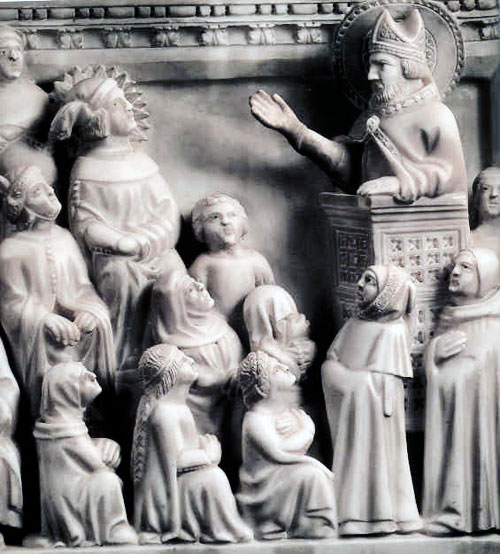The influence of Augustine (354-430) on Catholic thought cannot be exaggerated. His writings on various doctrinal and pastoral issues served as the taking-off point for much theological discourse in the Latin west. Augustine was both Bishop of Hippo in Roman North Africa and the superior of a monastic community; the pastoral concerns of both these roles afforded ample challenge for his considerable talents. The Africa of his day saw the church bitterly divided by the Donatist schism. The problem dated back to the early fourth century, when a group who would become known as the Donatists rejected the consecration of a Catholic bishop on the grounds that his predecessor had handed over sacred books and vessels to the Roman government in a time of persecution. The Donatists rejected the Catholic bishops as unworthy and held aloof from the Catholic rituals, feeling that the Catholics and all who shared their sacraments were tainted and separated from the true church. In this painful context, Augustine would develop his views on the eucharist as both the sign and source of unity for the Christian faithful.
A central idea for Augustine was the church as a unity in multiplicity. Without losing their individuality, the members of the church form an organic body with Christ, the head of the church. This mystical body of Christ is a union which includes all the saints, from Abel down to all those who are yet to be born. The identity of Christ with the faithful was the theme of Christ’s great prayer to the Father at the Last Supper, namely that all will be one just as Jesus and the Father are one. The sharing of the eucharist is thus a crucial way for the faithful to share together in the inner life of the Trinity.

Each day Augustine gathered with his monastic brethren and the laity to celebrate the eucharist. At this moment, the Christian faithful as one body, united to their head, together join in a sacrifice of praise. Central to this is Christ’s self-offering of his redemptive suffering and death on Calvary. But for Augustine, the doctrine of the mystical body leads to an even richer idea of what eucharistic sacrifice means. All of the faithful offer this sacrifice with Christ. Our sufferings, asceticisms, and humble and contrite hearts form a part of Christ’s self-offering, because we are a part of Christ’s body. In his classic work The City of God, Augustine develops this concept of sacrifice:
“So then, the true sacrifices are acts of compassion, whether towards ourselves or towards our neighbors, when they are directed towards God; and acts of compassion are intended to free us from misery and thus to bring us to happiness. . . . This being so, it immediately follows that the whole redeemed community, that is to say, the congregation and fellowship of the saints, is offered to God as a universal sacrifice, through the great Priest who offered himself in his suffering for us—so that we might be the body of so great a head—under ‘the form of a servant.’ For it was this form he offered, and in this form he was offered, because it is under this form that he is the Mediator, in this form he is the Priest, in this form he is the Sacrifice. Thus the Apostle first exhorts us to offer our bodies as a living sacrifice, holy, acceptable to God, as the reasonable homage we owe him, not to be ‘con-formed’ to this age, but to be ‘re-formed’ in newness of mind to prove what is the will of God—namely what is good, what is acceptable to God, what is perfect, because we ourselves are that whole sacrifice. . . . This is the sacrifice of Christians, who are ‘many, making up one body in Christ.’ This is the sacrifice which the Church continually celebrates in the sacrament of the altar, a sacrament well-known to the faithful, where it is shown to the Church that she herself is offered in the offering which she presents to God.”
Together with Jesus our head, the Christian faithful form what Augustine calls Totus Christus, the whole Christ. The eucharist then is not a ceremony which the congregation merely attends as passive witnesses. Our whole lives, our very thoughts and deeds, do nothing less than complete the redemptive offering of Christ’s own suffering. Indeed, the eucharist affirms that in our daily struggle to respond to God’s grace, we are not alone. When we gather for eucharist to share Christ’s flesh and blood, we are reminded of our dignity and responsibility as Christians, and of the one whose body we form a part.

From The Communion of Saints, Our Lady of the Angels cathedral, Los Angeles

Beautiful!
LikeLiked by 1 person
Thank you!
LikeLike
At the end of time all things will come together in Christ — this idea just blows me away!! What does this mean? Much more than we can ever imagine, except maybe Augustine could fathom it.
LikeLiked by 1 person
Yes, this is the great question, and one which brings so much comfort!
LikeLike